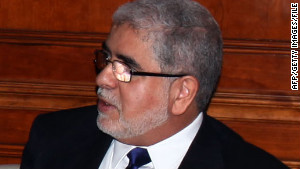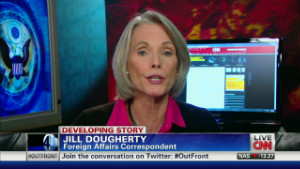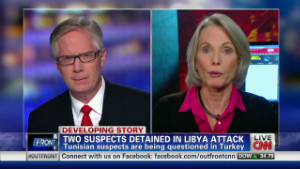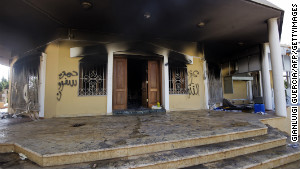
- The "no confidence" vote results in Prime Minister-elect Mustafa Abushagur's dismissal
- Abushagur proposed a downsized 10-member "crisis government" to lead the country
- "I refused to comply with their unrealistic demand," Abushagur says
- The congress postponed setting a new timetable for forming a government.
Tripoli, Libya (CNN) -- Libya's General National Congress rejected Prime Minister-elect Mustafa Abushagur's crisis government proposal Sunday.
The "no confidence" vote results in the automatic dismissal of Abushagur as prime minister-elect less than a month after he was appointed, while keeping the current government in place until a new one is formed.
The vote was overwhelmingly against the proposal, with 125 voting "no confidence," 44 "confidence" and 17 abstaining.
The General National Congress, which named Abushagur prime minister-elect on September 12, had given him a deadline of Sunday to submit the cabinet plan.
Abushagur proposed a downsized 10-member "crisis government" to lead the country during a time of instability in the North African nation.
Kidnapped Iranians freed in Libya
 Questions remain about embassy security
Questions remain about embassy security  State Dept denies plane to embassy
State Dept denies plane to embassy  U.S. Special Forces in Libya
U.S. Special Forces in Libya  'Investigators have to go' to Libya
'Investigators have to go' to Libya The GNC was set to vote on a 29-member cabinet Thursday, but Abushagur withdrew that list following criticism from many members of the congress. Protesters also stormed the congress headquarters.
After Sunday's vote, the congress renewed support for the interim government of Abdulrahim al-Kib, in which Abushagur is deputy prime minister, to serve until the government is formed.
Members postponed a decision on setting a new timetable for appointing a new prime minister and the deadline for forming a government.
The GNC, Libya's first elected body in almost half a century, came to power after a July national vote with two primary tasks -- to appoint a government and oversee the drafting of a constitution based on a timeline set by the country's 2011 constitutional declaration.
Abushagur, in his address at the GNC broadcast live on state television Sunday, criticized the country's politicians for prioritizing regional and political representation over Libya's interests.
He said he had been under great pressure from political blocs within congress for cabinet positions and that independent members of the GNC were pushing for ministerial posts for their regions.
"It is unfortunate that I am no longer worthy of confidence because I refused to comply with their unrealistic demand," Abushagur said.
"These conditions that were imposed on me to form a government contradict my own principles that I announced from this podium on September 11th," he said. "I am not willing to abandon the principles and values that I believe in and lived my entire life based on."
Abushagur said he was being forced to form a government based on regional quotas, not one with qualified individuals who can lead Libya through a period he said was one of the most delicate times in its history.
"Libya is now facing dangerous challenges that threaten its stability and national unity," he said. "The situation in Bani Walid could explode if it is not dealt with wisely. The situation in the south is a crisis and the repercussions of the attack on the U.S. consulate could lead to foreign intervention that could lead the country into a whirlpool it will not get out of."
Libyan troops surround pro-Gadhafi stronghold
Libya is facing a political vacuum almost a year after the killing of Moammar Qadhafi. It is a time of instability and rising security threats -- with emboldened Islamist extremist groups in the east, recurring tribal and ethnic clashes in the south and hundreds of armed militias that continue to operate across the country with no government control.
Libyans went to the polls three months ago with expectations of change and progress that elected officials could bring about. Now public frustration is mounting with the lack of security, the slow process of creating a strong army and police force and rebuilding the country.
Two Tunisians questioned about attack on consulate


